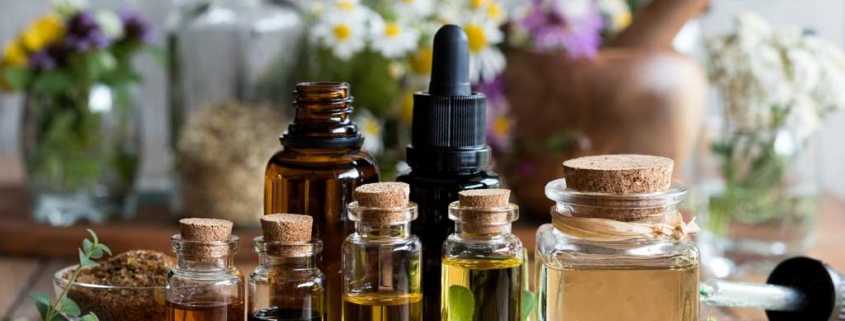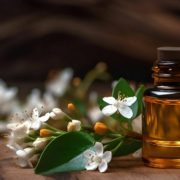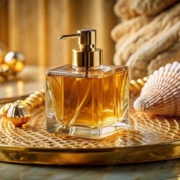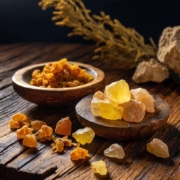Antibacterial Essential Oils
Even though conventional antibiotics have been the most powerful weapon for eliminating infections caused by micro-organisms like bacteria since the arrival of penicillin, the frequent use of these drugs may gradually develop antibiotic resistance and render them ineffective.
Besides, most antibacterial medications are actually modeled from essential oils that are derived from natural resources. Therefore, the natural options should be your first and foremost approach to fighting bacteria by combining antibacterial essential oils and healthy foods.
Before we get started with antibacterial essential oils that can fight against bacteria, it’s important to learn the basics of bacterial infections a little bit more.
Table of contents
-
What are bacteria?
-
What are bacterial infections?
-
Symptoms of bacterial infections
-
Do essential oils fight bacteria?
-
What essential oils are natural antibiotics?
-
How to use antibacterial essential oils
-
Precautions with antibacterial essential oils
-
Final words
-
Disclaimer
What are bacteria?
Bacteria are single-cell and microscopic organisms. They can live almost everywhere regardless of climate and location. Bacteria can live on and inside the human body. Most bacteria are airborne while others live in soil and water. Bacteria is a plural term and the singular term is a bacterium.
What are bacterial infections?
While most bacteria are harmless and some are even beneficial to the human body, very few bacteria cause sickness. A bacterial infection is nothing but the proliferation of bacteria that are harmful on or inside the human body.
Bacteria may infect any part or organ of the body including the intestine, skin, bladder, lungs, and brain. Food poisoning, otitis media, cellulitis, boils, meningitis, and pneumonia are just a few types of illnesses that are typically caused by harmful bacteria.
Symptoms of bacterial infections
Symptoms of bacterial infections can be classified into 2 types –
Generalized symptoms – such as fever, fatigue, sweats, chills, and headaches.
Localized symptoms – such as swelling, pain, hotness, redness, and organ dysfunctions.
Do essential oils fight bacteria?
Some essential oils contain antibiotic chemical components and these components provide the oils the properties to kill certain bacteria as well as many other micro-organisms such as fungi and viruses.
The bacteria-fighting components vary depending on the specific oil. Most common chemical components of essential oils that show significant ability to fight off bacteria include phenols, ketones, lactones, and aldehydes.
These components have tremendous disinfecting properties that can kill and sterilize a range of pathogens including bacteria, viruses, and fungi, making them powerful natural antibiotics.
What essential oils are natural antibiotics?
Essential oils have been used in natural and traditional medicines for centuries throughout the world to fight a large number of medical conditions, whether we’re talking essential oils for depression and anxiety to essential oils for infections and allergies.
So, the concept of using essential oils to combat infections isn’t anything new. Besides, modern studies found that certain essential oils can effectively kill micro-organisms including bacteria, viruses, and fungi without becoming resistant, making these essential oils great antimicrobial resources in modern medical science.
Here are a few antibiotic essential oils that help to fight diverse types of infective conditions and are popularly known as antibacterial, antiviral, and antifungal essential oils.
Lavender (Lavandula officinalis)
The lavender essential oil has been detected to be very effective to fight many species of bacteria especially those resistant to antibiotics including vancomycin-resistant Enterococcus (VRE) and methicillin-resistant Staphylococcus aureus (MRSA). Besides, it shows strong antimicrobial effects against several foodborne bacteria such as Enterobacter cloacae and Escherichia coli (E. coli).
Check out our natural Lavender here.
Oregano (Origanum vulgare)
Oregano oil contains thymol and carvacrol that show remarkable antibacterial properties against gram-negative bacteria and lesser actions on gram-positive bacteria. Oregano is also beneficial for healing minor wounds and repairing the skin.
Check out our Oregano here.
Peppermint (Mentha piperita)
Peppermint oil has antibacterial, antiviral, and antifungal properties that can fight various types of bacteria and yeasts. It helps to clean the skin naturally and soothe inflammation and irritation of acne. Peppermint oil is very helpful in respiratory infections.
Check out our Peppermint here.
Lemongrass (Cymbopogon citratus)
Lemongrass oil has limonene and citral compounds that help kill various bacteria and fungi. Studies suggest that lemongrass oil is very effective to kill bacteria that cause skin and intestinal infections such as ringworm and athlete’s foot.
Eucalyptus (Eucalyptus globulus)
Eucalyptus oil has tremendous antibacterial and antifungal actions that can kill many bacteria such as Mycobacterium tuberculosis and fungi such as Candida. This oil is often used to treat bruises, cuts, acne, boils, cuts, and insect bites.
Thyme (Thymus vulgaris)
Thyme oil has been found to be extremely beneficial for killing foodborne bacteria and fungi, especially those that are found in milk. It shows significant antibacterial actions against Helicobacter pylori, Salmonella, and Staphylococcus aureus. This oil is widely used for treating infections related to the upper respiratory system.
Check out our Thyme here.
Clove buds (Syzygium aromaticum or Eugenia chiarofillata)
Clove oil contains eugenol and oleic acids that can kill diverse types of gram-positive and gram-negative bacteria. Clove oil has been traditionally used in treating tooth and oral infections for decades. It helps to reduce skin itching, stomach pain, and a number of respiratory conditions.
Check out our Clove buds here.
Other antibiotic essential oils with antibacterial properties
How to use antibacterial essential oils
Antibacterial essential oils can be used in several different ways. You can ingest them internally only if they are 100 % pure. Also, you can use them by diffusing or topically depending on the purpose or type of bacterial infections.
Precautions with antibacterial essential oils
Essential oils are highly concentrated extracts from herbs and other natural substances and often need to be diluted with career oils such as coconut oil, olive oil, or jojoba oil. Though essential oils are natural and usually safe for most people, in rare cases, they may trigger allergic reactions and interfere with other drugs. Therefore, whenever you consider using essential oils for underlying medical conditions, make sure you ask your doctor or a holistic medicine practitioner.
Final words
With the growing concern of antibiotic resistance, antibacterial essential oils can be great alternatives to eliminate existing infections as well as prevent them at the first stage.
But you should always keep in mind that essential oils need to be used with proper knowledge and education. Hence, it’s highly recommended to seek the direct supervision of a naturopathic doctor before using antibacterial essential oils to treat infections.
Disclaimer
The information and advice in this content are generic and purely intended for educational purposes, thus, never replace any prescribed medical advice.

























Leave a Reply
Want to join the discussion?Feel free to contribute!